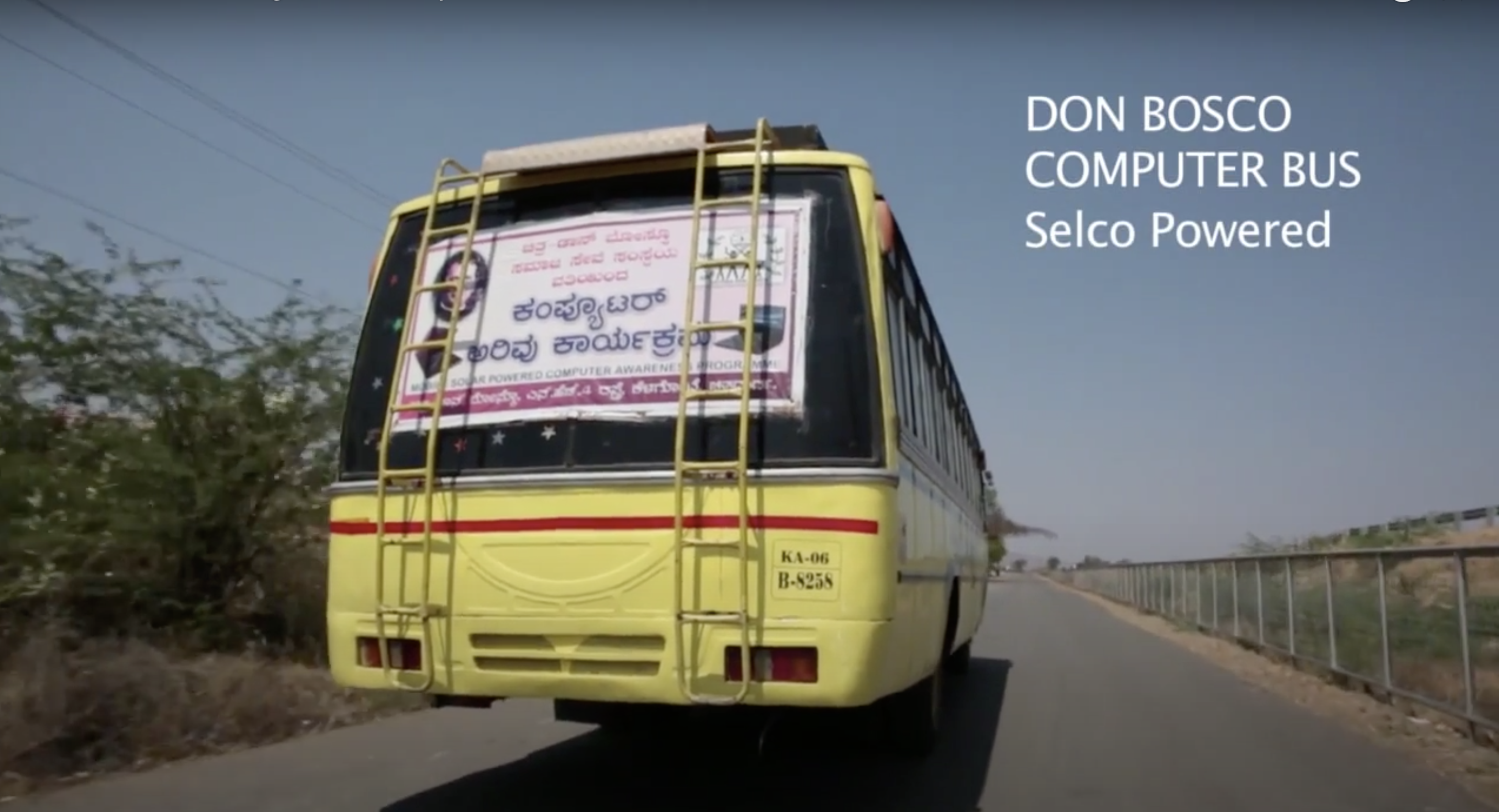Background
The user’s main need was a dependable energy source to power computers, due to infrastructure failure and constraints of skilled teacher availability, education quality and access. Even if schools want to provide computer training, the power supply is erratic and does not permit classes to function. Additionally, there is a lack of skilled teachers in local schools.
A bus hosting a computer class, powered by solar, was designed by SELCO and Don Bosco. The bus travels from school to school, in different villages, providing local children with access to basic computer education. The bus is an example of mobile-learning centers, a replicable intervention with high impact and applicability potential for rural communities. This case study documents the lessons in project design and delivery of high quality computer education without worrying about power outages, theft of computers, unavailability of teachers and quality of content.. The bus has been functional since early 2012 and delivers computer education to more than 50 rural students on a daily basis.
Technological Solution
2400Wp array operating at 72V, 10 laptops, and backup batteries.
Laptops were designed for 6 hours of daily usage; 3 fans and 1 light also provided in the bus.
The system was designed to charge daily, with an option to charge through the grid power, if needed.

Financial Model
The capital cost was covered via philanthropic funds. Upkeep, maintenance and operating expenses completely covered by Don Bosco.
Key Aspects
Unforeseen challenges– Solar panel storage with several redesigns of padded covers and appropriate straps for hanging the panels inside the bus. Also, recurrent DC plug breakage caused bottlenecks.This emphasized the importance of proximity to suppliers, and represented considerable expenses.
Exemplary design–The bus was made to have an alternative grid option to ensure reliable performance, a change which implied a changeover switch. The entirety of the computer charging system was made detachable and user-proof, such that it cannot be plugged in wrong even by mistake by utilizing different sockets. Even the solar panels were made mobile for storage and charging.
Solution Design
All families own a one light + mobile charging point which includes a 3 W CFL bulb, a mobile charger. The central charging station has a provision for 7.5W of panel per 4.5Ah battery with autonomy of two days. The average cost of such a system including installation, 5 year warranty and 1 year annual maintenance is Rs4000. Mobile charging was also a major expenditure as it’s the only source of entertainment; individuals spent over Rs150 a month just on charging mobile phones. They now charge it at home for free. The first 30 systems are implemented through a community-owned model. As no bank could take on the risk, keeping funds as risk management- SELCO Foundation installed the central charging station on a deposit of Rs 200 from each family. The households pay a minimum of Rs100 per month and a maximum of Rs 400 (variable instalments) to a group of representatives chosen by them from within the community. The monthly collection is handed over to a community representative.
Project Nuances
SELCO received an emptied school bus. The space was made safe for children, also made it darker with appropriate ventilation for classroom use, and equipped with accessories to allow for the solar panels stored in the bus and carried and placed outside where charging occurs. SELCO design took 5 months. In terms of educational content, children are taught: physical parts of technology, short history and advantages of the computer, how to handle it& become familiar with Word, Notepad & Paint.
Learnings
Managing Partner: The bus is deemed a successful and fully replicable model, but the success of the product, its continued performance and use is almost completely reliant on the managing partner. The client and partner organization must be committed and accountable since this determines the entirety of the bus’ impact.
Impact indicators: The education content supplied through the solar bus creates technology awareness, though it’s recurrent lessons and the degree to which students develop familiarity and understanding of the technology over time remains unclear. SELCO enabled the solar bus, but was not responsible or involved in the education aspect. Future projects have to potential to create skills transfer, education, or awareness and outreach campaigns ranging from financial and technology literacy to access to information.
High Costs: Don Bosco believes four more buses would allow them to reach more children and the same child more often; cutting operating costs and increasing the impact of each bus, but resources remain the primary limitation. Still, this project becomes less costly with scale.
